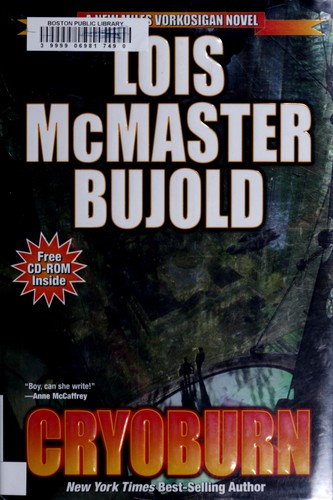enne📚 reviewed Cryoburn by Lois McMaster Bujold
Cryoburn
3 stars
This is the final Miles-centric book for the series. One of the best parts of this book is that we get so much of Armsman Roic's wry point of view of the shenanigans.
To me, this one is weakened by trying to hearken back to the mode of adventure investigation Miles. Diplomatic Immunity works for me because it's sandwiched between two romantic comedies, involves Ekaterin, ties together a number of elements, and crucially ends with a "we really can't keep doing this anymore" moment for Bel and Miles. So, it's a little weird that he does, in fact, keep doing this. This book is set on a new Japan-esque planet that we have not heard of previously and involves mostly new characters; it largely feels like a one-off than a series capstone.
I think there are a lot of good components to this book that don't all gel …
This is the final Miles-centric book for the series. One of the best parts of this book is that we get so much of Armsman Roic's wry point of view of the shenanigans.
To me, this one is weakened by trying to hearken back to the mode of adventure investigation Miles. Diplomatic Immunity works for me because it's sandwiched between two romantic comedies, involves Ekaterin, ties together a number of elements, and crucially ends with a "we really can't keep doing this anymore" moment for Bel and Miles. So, it's a little weird that he does, in fact, keep doing this. This book is set on a new Japan-esque planet that we have not heard of previously and involves mostly new characters; it largely feels like a one-off than a series capstone.
I think there are a lot of good components to this book that don't all gel together. The shadow at the end of the book is that Miles' father Aral Vorkosigan dies, not altogether unexpectedly. And so, this book focuses on a planet where people freeze themselves before death, so that they might be revived later if needed. Unfortunately, I feel like the mystery is more of an conspiracy cover-up investigation of corporations and voting; the (possibly) more interesting cultural feelings around postponing death feel largely unexplored. There's certainly some parallels around children and the absence of their parent, but this wasn't enough to make this book thematically resonate as strongly as it should have.
The ending moment is quite good though, containing fanfic-esque five views of Aral's death, written as drabbles. This is the highlight of the book for me, but is weakened by how thematically disconnected it feels from the rest.


